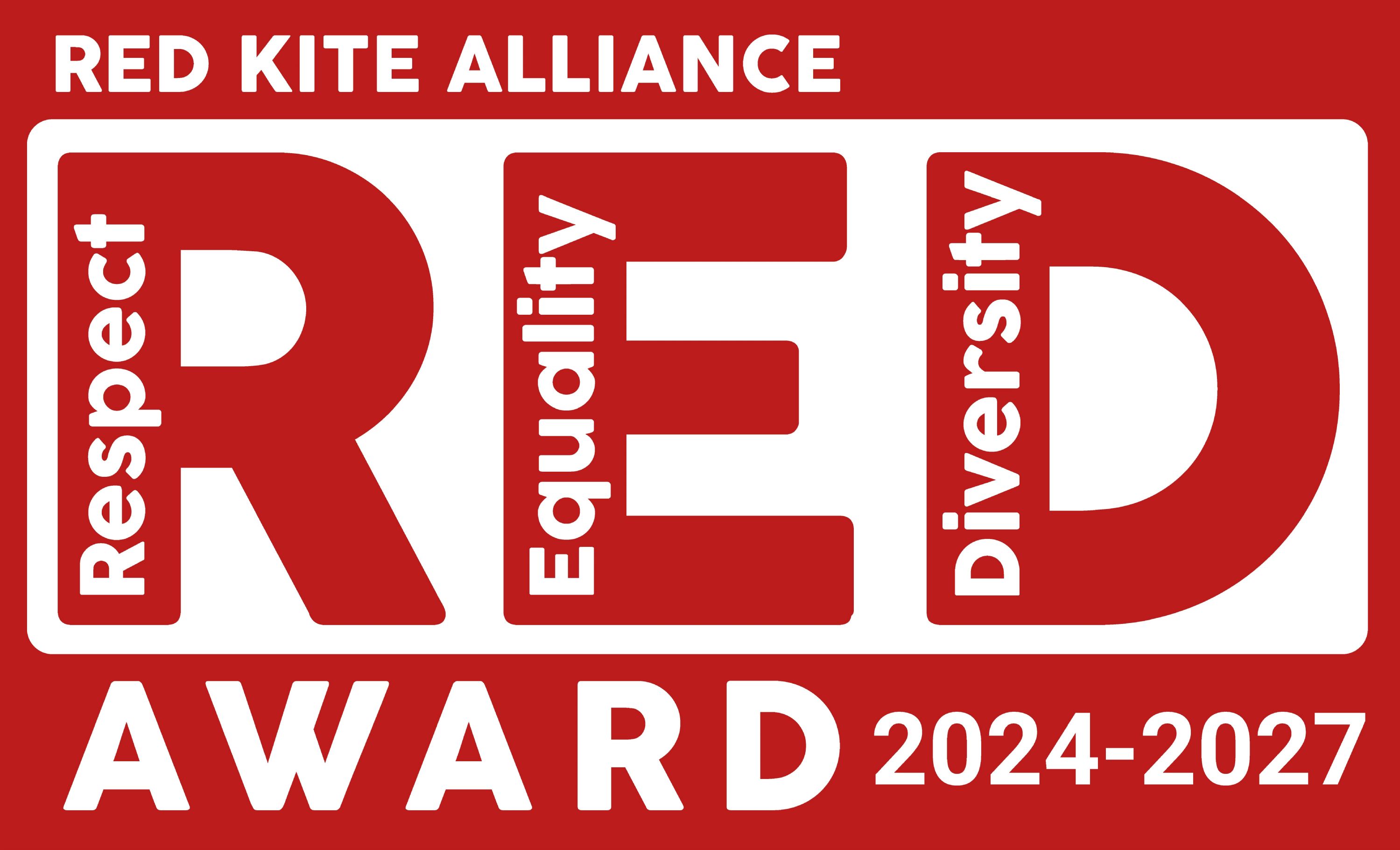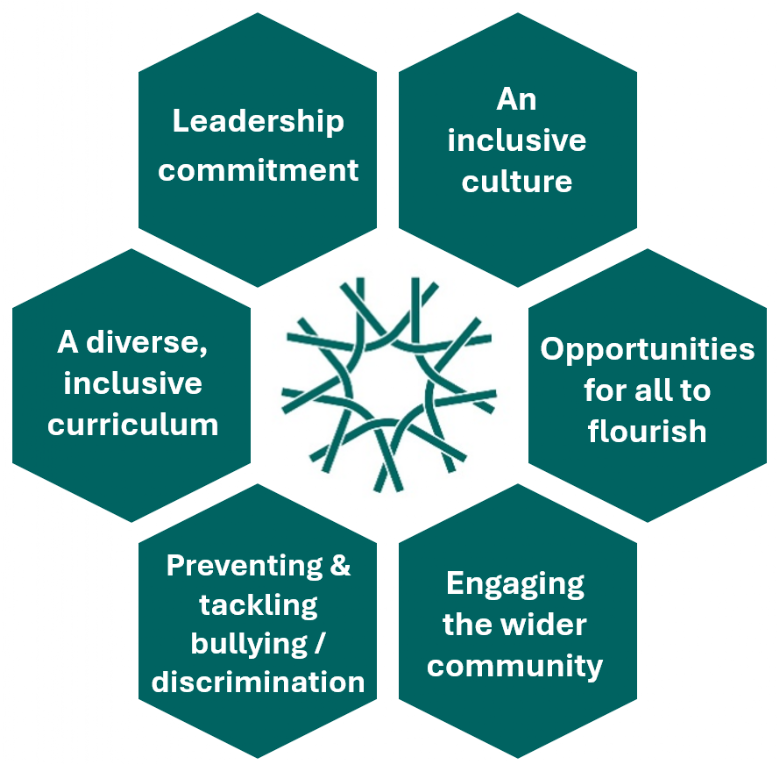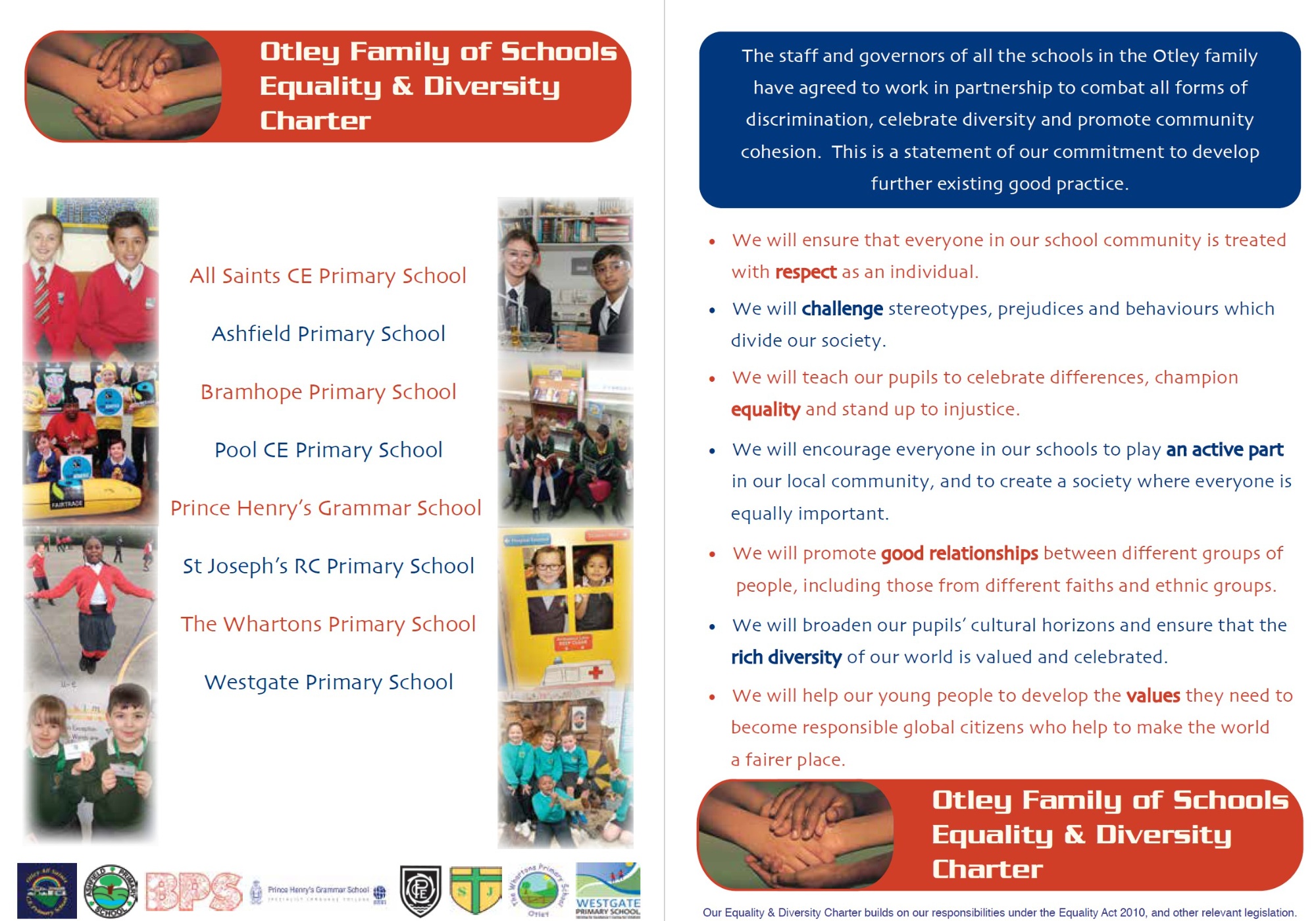Equalities
Prince Henry’s Grammar School is known across the region as a school which champions equality and diversity, and we are regularly asked to share our work with other schools. Our distinctive ethos is underpinned by our school Vision and Values, and is characterised by a cohesive community in which we:
- Establish and embed a culture of mutual respect

- Celebrate the diversity of our school and the wider world
- Tackle all forms of discrimination and harassment
- Promote equality of opportunity so that everyone in our school community can flourish and achieve
- Help students to develop as informed, compassionate global citizens
- Build good relationships between people who share different characteristics
- Contribute to the cohesion of our local community and wider society
- Meet our statutory duties under the Equality Act (2010)
We are extremely proud to be one of the very first schools to achieve the Red Kite Alliance RED Award as part of our commitment to embedding a culture of Respect, Equality and Diversity (see below for more details).
We are also delighted to have secured the Stonewall School & College Champion Award GOLD in recognition of our work to champion LGBT+ equality and tackle homophobia, biophobia and transphobia.
These achievements build on our equalities work over the past couple of decades, including our engagement with the former Stephen Lawrence Education Standard, for which we achieved the highest level of this prestigious award.
As well as our ongoing work across the curriculum, each year we hold an Equality and Diversity Week in the summer term, focusing on different aspects of equality and diversity.
Equality Objectives
In accordance with the Equality Act (2010), as a school we publish a series of Equality Objectives to build further upon our achievements in terms of equality and diversity. Our current Equality Objectives (2023-2025) include the following key objectives:
Objective 1: To continue to embed curriculum-based work on discrimination linked to race, faith, sex, gender identity, sexual orientation, disability and socio-economic disadvantage. |
|
|---|---|
| Why we chose this objective | |
| If our students are to flourish as happy, confident individuals who are proud of who they are, it is essential that they can see themselves reflected through the curriculum that they study, and that they encounter a wide range of diverse role models. Likewise, if they are to develop as compassionate, open-minded, informed citizens, they need to learn about, and understand, what makes people different. We believe that this can be achieved, in part, through ‘one off’ lessons, ‘drop down’ days, themed assemblies, ‘ad hoc’ class discussions, etc. However, we believe that it is most effective when threaded through the regular, planned curriculum. We are proud of what we already do, but know that a more systematic, comprehensive approach will ensure that all characteristics are celebrated positively across all subjects and in all year groups. | |
Objective 2: To work with staff and students to tackle racist attitudes and behaviours across the school and wider community. |
|
|---|---|
| Why we chose this objective | |
| Our monitoring of prejudice-based behaviours suggests an increase in the number of race-related incidents over the past year or so. There could be many reasons for this: heightened awareness that this behaviour is unacceptable, improvements to reporting systems, a growing tendency to use thoughtless language, renewed negative messaging in the media / on social media regarding asylum seekers and immigration or a growth in wider intolerance in our communities. Whatever the reason, we want to give a clear message that racism is always unacceptable and will always be addressed in our school. It is only by properly educating our students about racism and adopting a robust stance in school – through both a preventative and responsive approach – that we can help to bring an end to racism in our local community and in wider society. | |
Objective 3: To develop further our support for LGBT+ students and serve as a beacon of best practice for other schools. |
|
|---|---|
| Why we chose this objective | |
| For over a decade, Prince Henry’s has been recognised for its anti-homophobia work as part of our wider commitment to ensure that all students are free to be themselves without fear of bullying or discrimination. At the same time, society’s attitudes to issues of gender identity and sexual orientation have, in many respects, become more, rather than less, complex for our students to navigate. We acknowledge that we cannot be satisfied with past achievements in this area and that we must build on our success in securing the Stonewall School & College Champion Award to ensure that our LGBT+ students are properly supported, and that all students at Prince Henry’s develop open-minded, tolerant attitudes in these areas. At the same time, we want to share our experience in this area to benefit all students in all schools. | |
Objective 4: To increase student and community engagement in our work related to equality, diversity, social justice and global citizenship. |
|
|---|---|
| Why we chose this objective | |
| For our equality and diversity work to have real impact we need all students in our school to engage with it positively. We also want our students to take a proactive role in championing social justice in its widest sense, including issues of global citizenship and climate justice. This means not simply learning about these things but also doing something about them. At the same time, we appreciate that the impact of our actions is amplified when we work together with other parts of the community, including other schools. We also understand that partnership work provides another vehicle for our students to learn about and embrace difference, and for community partners to learn about them. | |
Objective 5: To continue to narrow the gap in attendance and achievement between students from different learner groups. |
|
|---|---|
| Why we chose this objective | |
| We want all our students to achieve the very best that they can, regardless of the barriers which they may face. We also want all our students to have high levels of attendance so that they can benefit equally from the rich curriculum and wider personal development opportunities which we provide. However, our own analysis of data shows that, on some measures, there are gaps in achievement between some learner groups, in particular between disadvantaged students and non-disadvantaged students. Similarly, there is a gap in terms of the attendance between these groups, as well as between SEND and non-SEND students. | |
Equality Information
At Prince Henry’s Grammar School, we work hard to meet our obligations under the Public Sector Equality Duty (known as the ‘equality duty’). This includes having due regard to the need to:
- Eliminate unlawful discrimination, harassment and victimisation and other conduct prohibited by the Equality Act 2010.
- Advance equality of opportunity between people who share a protected characteristic and those who do not.
- Foster good relations between people who share a protected characteristic and those who do not.
As required by the equality duty, each year we publish updated information to demonstrate how we are complying with these obligations.
|
We eliminate discrimination by:
|
Equality Policy
Please visit the School Policies page for copies of relevant policies, including our Anti-bullying Policy and Equalities Policy.
Red Kite Alliance RED Award
The Red Kite Alliance RED Award, recognises schools for their commitment to, and success in, embedding a culture of Respect, Equality and Diversity. The Award has been developed by staff at Prince Henry's Grammar School on behalf of the 50 schools which make up the Red Kite Alliance.
Visit the RED Award webpage for more details.
Collaborative Learning Trust Equality and Diversity Charter

In June 2024, after a year-long process which began with our student leaders from the Trust coming together and collaborating, we launched our Trust Equality and Diversity Charter. This is a living document, which everyone in our Trust works together to embed in our daily practice. You can read about the launch here.
We want all schools in the Collaborative Learning Trust to be harmonious, inclusive places where every individual can thrive and reach their full potential because differences are celebrated, inequality is eradicated, and discrimination is systematically addressed.
Our Equality & Diversity Charter is underpinned by the values of our Trust and covers six key areas: an inclusive culture; opportunities for all to flourish; engaging the wider community; preventing/tackling bullying/discrimination; a diverse, inclusive curriculum; leadership commitment. The Charter is available to download below.
Otley Family of Schools Equality and Diversity Charter
To signal our joint commitment to equality and diversity, we launched the Otley Family of Schools Equality and Diversity Charter, in partnership with seven local primary schools. This builds on the work done by our schools since our 2010 Anti-Racism Charter and develops that theme into a wider agenda. The Charter revolves around seven key principles: respect; challenging stereotypes; equality; actively creating a better society; good relationships between all people; valuing the world’s diversity and making the world a fairer place. The Charter is available to download below.

Good Practice Case Study
Our work in tackling homophobia has received national acclaim. We were delighted to host a visit by Sir Ian McKellen on behalf of the equality campaigning organisation Stonewall and, over a decade ago, to be featured as the subject of an Ofsted Good Practice Case Study on tackling homophobic bullying.
